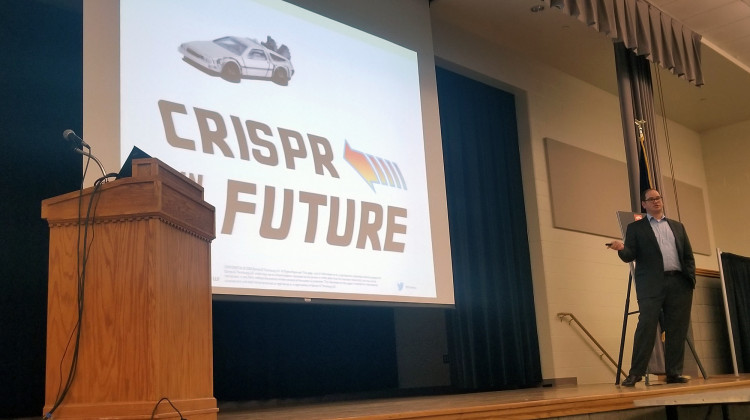
Barnes and Thorneburg patent lawyer Eric Williams tells Midwest pork producers about gene editing at the 2018 Midwest Pork Conference.
Samantha Horton/IPB NewsHoosier farmers learned more at a conference this week about how biotechnology might transform their industry. But while producers might cheer the effort, consumers’ doubts could have an impact on sales.
Barnes and Thornburg patent lawyer Eric Williams told those gathered at the Midwest Pork Conference that while it may be a while before gene-edited animals are found on farms, producers need to be aware of what’s coming.
“Gene editing is the reality, I mean you saw the news last week with the scientist in China editing human embryos, so I don’t think the science is slowing down any,” says Williams. “I think that things are accelerating where gene-edited products or gene editing of animals is going to become so common place that farmers need to know and producers need to know what’s going on so they can adapt their practices later on.”
One gene editing technique that’s been around since the 1980s is CRISPR, Clustered Regularly Interspaced Short Palindromic Repeats.
Williams says CRISPR technology is much like working on a word processor.
“When you misspell a word, time and time again in a document you can do a global find and replace,” he says. “So in other words, the document finds all the misspelling of a particular word and replaces them with a correct spelling.”
Some consumers still question genetically modified organisms even though scientists have cross-bred crops and people have eaten them for many years.
Williams says farmers should help make the case that gene editing, where scientists edit out undesirable traits in a lab, is at least as safe.
“The gene editing procedure is a much more precise, much more simple procedure that goes into editing the genetic profile of crops and animals,” he says.
So far only one genetically modified animal, a type of salmon, has been approved by the Food and Drug Administration. However, AquaBounty, the company that produces the fish, is still unable to produce and sell in the U.S.
A 2015 report found that Indiana agriculture brings in about 15 billion dollars to the state economy.
 DONATE
DONATE






 Support WFYI. We can't do it without you.
Support WFYI. We can't do it without you.